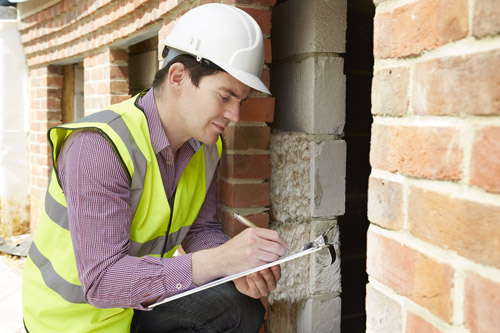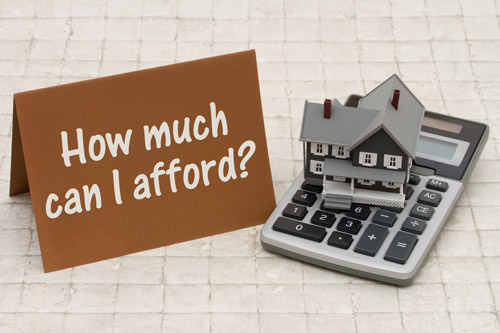These 11 Tips for First-Time Home Buyers will help you navigate through the process of buying your first home.

Once you decide you want to purchase your first home, it is a good idea to take some steps to ensure you have a successful purchase. These steps include applying for a mortgage, searching for the right property, negotiating the contract, inspections, and loan underwriting to name just a few.
- Tip #1 Start Saving Money
- Tip #2 Review Your Credit Report
- Tip #3 How Much Down Payment
- Tip #4 Private Mortgage Insurance
- Tip #5 Get Preapproved
- New Construction in Davidson County, NC
- Tip #6 Start Searching for Homes
- Tip #7 Work with a Realtor
- Tip #8 Preparing the Offer
- Tip #9 Order Inspections
- Tip #10 Getting Ready to Close
- Tip #11 Homeowners Insurance
Tip #1 Start Saving Money
 Start saving money for the down payment and closing costs. It is a good practice to have your bank set up an automatic payment to go right into a savings account from every paycheck.
Start saving money for the down payment and closing costs. It is a good practice to have your bank set up an automatic payment to go right into a savings account from every paycheck.
If you can work extra hours or get a part-time job put this money into your house fund. By saving this way, it will prove to the bank that you are responsible and serious about becoming a homeowner by having an established savings pattern.
Tip #2 Review Your Credit Report
Obtain your credit report and check for errors. If your score needs to be higher to qualify for a mortgage, you will have time to take the necessary steps to improve it.
Banks use ratios to calculate how much you can afford to borrow. These are called the Debt to Incomes Ratios. It is the percentage of your gross monthly income that goes toward paying your monthly debts.
The more debt you can pay off before buying a home, the more home you will be able to afford to buy. For a more detailed explanation of qualifying ratios, check out this post from NerdWallet.
You might also like my post on What Information Makes up Your Credit Score.
Tip #3 How Much Down Payment
A common misconception among potential first time home buyers is that they need to put 20% down on a property. In reality, there are loan programs designed for first-time homebuyers that require a 3.5 % down payment and some that do not require a down payment at all.
Two popular types of loans that are frequently used by first time home buyer are the FHA loan and the USDA loan. These loans are backed by the government and were designed to help first-time homebuyers achieve homeownership.
FHA Loan
An FHA loan is an insured loan protecting the bank from default. There is an upfront mortgage premium paid by the borrower that is added to the loan amount.
Your monthly house payment will also include the premium for this insurance. This insurance protects the bank who issued the FHA loan if the borrower defaults. Not all banks offer FHA loans. The bank must be an approved FHA lender.
An FHA loan requires a 3.5% down payment. This money can come from cash the borrower has saved, or it can be gifted money from a family member. For example, on a purchase price of $150,000 home, the down payment required to purchase the home would be $ 5,250.00 ($150,000 X .035).
USDA Loan
A USDA loan is guaranteed by the United States Department of Agriculture and Rural Development, with the purpose of promoting homeownership in rural areas. The property has to be in an eligible area to qualify for this loan. Here is a website to check the property address to see if the home would qualify. A home cannot be located in the city limits.
Most homes located outside the city limits in Davidson County, qualify for a USDA loan. There is no down payment requirement, so a USDA loan is in effect 100% financing.
Like the FHA loan, there is an upfront fee added to the loan amount and a yearly fee which is included in the monthly mortgage payment. There are income limits to qualify for a USDA loan.
Tip #4 Private Mortgage Insurance
As with government back loans, if you put less than 20% down on a conventional loan, you are required to pay PMI (Private Mortgage Insurance). This is insurance that protects the bank in case you default on the loan.
The premium for this insurance is added to your monthly house payment. Some people believe that it is better to save up 20% for a down payment. However, that might take 3 to 5 years or longer. In the meantime, home prices appreciate, and interest rates might rise.
What everyone needs to do, is calculate the cost of waiting or going ahead with a lesser down payment option. For more information on Private Mortgage Insurance check out this post from The Mortgage Report.
Tip #5 Get Preapproved
When you are ready, get preapproved by a lender. The bank’s loan officer will inform you of the different types of loans that are available to you and their advantages, disadvantages, and loan terms.
The loan officer will estimate what your down payment and closing costs will be. You might need help from the seller with your closing costs and will need to negotiate this in your offer.
This is a common negotiated item with first-time buyers. A letter from your bank is required when you submit an offer, so it is a good idea to already have this step completed in advance of making an offer.
Mortgage Calculator
New Construction in Davidson County, NC
Tip #6 Start Searching for Homes
 While you are saving money for a home you can set-up a buyer’s account and start searching online. Start to make a list of what you must have in a home and then features that would be nice to have. Rate these items in their importance.
While you are saving money for a home you can set-up a buyer’s account and start searching online. Start to make a list of what you must have in a home and then features that would be nice to have. Rate these items in their importance.
If you find some neighborhoods you like online, drive by and scout out the community to get a feel for the area. By searching online you will get a feel for what the local real estate market is doing. Are homes going under contract quickly? This is a sign that it’s a seller’s market.
Register for FREE BUYER ACCOUNT
Tip #7 Work with a Realtor
When you are ready to start looking at homes on your list, find a buyer’s agent you feel comfortable working with. They should be knowledgeable about the market and responsive to your needs.
The commission breakdown the seller agreed to when listing their property pays for the buyer’s agent services at closing.
Make sure to communicate with your agent about your housing needs, the features you would like to have, and the price range you feel comfortable with. If your work commute is important and other family activities, drive the routes to see if the neighborhood’s location works for you.
Tip #8 Preparing the Offer
Once you find a home you want to buy you need to decide what amount you want to offer the seller. Your agent will give you comparable properties that have recently sold in the neighborhood so you have a general idea of what homes are selling for in the neighborhood.
Second, consider what type of market you are in. Is it a seller’s market where sellers are receiving multiple offers? If that is the case, you might not have as much wiggle room with the list price.
Third, if you need closing cost help from the seller make sure to include that amount in your offer. It is a common practice for first time home buyers to ask for help with their closing costs.
Fourth, consider asking for a Home Warranty if it is not already offered by the seller. A Home Warranty is an insurance policy for major components in the home. The policy term is usually for one year. This warranty can help out if something major needs repaired or replaced the first year you are in your home.
Fifth, read over the offer to purchase contract and other forms and disclosures so that you understand all the terms. Ask your agent or an attorney if you have questions regarding the offer.
Most agents use programs like DocuSign to send the offers and addendums by email for your signature. That is great because it makes everything easier to send and expedite offers and contracts to the different parties. However, don’t just initial and sign where the program tells you to before you understand what you are signing.
Tip #9 Order Inspections
 Once you have found a home and are under contract, you will need to research information about the home and set up the inspections you want to have. Your agent can help you with this.
Once you have found a home and are under contract, you will need to research information about the home and set up the inspections you want to have. Your agent can help you with this.
Scheduling and completion of home inspections take place during the due diligence period in North Carolina. This is a negotiated timeframe in the contract to accomplish these tasks.
After you have reviewed the reports, there might be some repairs you want the seller to fix. This starts another round of negotiations with the seller.
Tip #10 Getting Ready to Close
A lot of things are happening behind the scenes during the loan processing of your file. Once the bank gets a signed contract, they will order the appraisal on the property. They will verify all the information you have supplied them in your loan application.
When everything seems in order, the bank will have the closing attorney check the property’s title at the local courthouse. All these things are going on while the inspections are being done.
During this time, if the bank has questions about the information you have supplied or needs more documentation try to get the answers and documents to them as soon as possible.
Tip #11 Homeowners Insurance
The lender will require that you carry homeowner’s insurance to protect the home. When looking into what company to use, check with your automobile insurance company to see if they offer discounts for carrying multiple policies.
When getting quotes from different companies, check to make sure the terms are the same. This is another area where a good credit score will give you a better premium than someone with a bad credit score.


